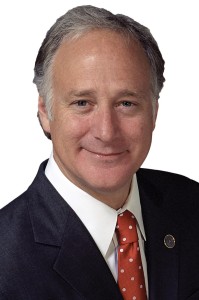Senator texted warning into closed session on firing UT president

Sen. Kirk Watson, the Democratic former mayor of Austin, says a board can only hold executives accountable if there are no ‘external influences,’ such as, well, himself.
By Jon Cassidy | Watchdog.org
HOUSTON — State Sen. Kirk Watson says that if the University of Texas System Board of Regents wants “to hold someone accountable,” namely, UT President Bill Powers, the board must “assure that there are no external influences” on its decisions.
Yet when the board met in executive session Dec. 12 to decide Powers’ fate, Watson decided to make himself an external influence, sending board Chairman Paul Foster an ominous text message warning him not to set a final date for Powers’ employment.
“Setting a future date for the President to leave is no more than a deferred termination,” Watson texted Foster during the meeting. “Three of the regents testified that they would not vote for termination absent a recommendation from the Chancellor.”
Watson was referring to a commitment he had extracted last May from Foster, Jeffrey Hillebrand and Ernest Aliseda during a hearing on their nominations to the board. Watson spent nearly an hour that day in May asking for variations on that commitment, but it was irrelevant on Dec. 12, as the board was meeting specifically to consider a recommendation by Cigarroa on Powers’ employment.
Watson said his concern was “based on rumors,” but we heard a very similar version before the Dec. 12 meeting from knowledgeable sources: Chancellor Francisco J. Cigarroa had asked Regent Steve Hicks about setting a final date for Powers’ employment. Hicks is a firm Powers’ supporter, and obviously, didn’t go for a compromise that was more like surrender.
After four and a half hours in executive session, it was clear there weren’t five votes on the nine-member board to replace Powers, even with the face-saving option of deferred termination. There was no point in a public vote.
So Cigarroa “recommended” that Powers keep his job. Then he declared his frustrations with Powers and their strained relationship in the public session that followed.
“The main reason for the strain is that Bill and I would agree upon certain principles, and I would act on those principles, but then Bill Powers would often convey a message of misalignment, leading to conflict between UT System administration and the University of Texas at Austin,” Cigarroa said.
Foster had told legislators much the same thing in May.
“He has been very difficult for the regents to work with,” Foster said then. “My concern is that in some instances the controversies and issues surrounding him are so overwhelming and so significant it frustrates the whole process and detriments the entire system.”
Two months after Powers prevailed, Cigarroa announced his own eventual resignation. The reason his own job had become so impossible is that Powers has an independent power base in the Legislature willing to slap around his ostensible bosses — the regents and the chancellor.
The question is whether Powers keeps those legislators happy with admissions favors, as some have alleged. Last year, Sen. Royce West attested to Powers’ skill at piling up chits. As the Austin American-Statesman reported, West “said political capital is the currency of the Legislature and Powers has it in abundance. ‘Not only can we take your word to the bank, we can also use it as collateral.’”
Watson is another of Powers’ water carriers, and he’s been more than willing to lead the attack on Regent Wallace Hall, a Powers antagonist.
When the board told Powers to stop deleting his official e-mails, Watson pronounced the decision “extraordinarily disappointing.”
When a group of lawmakers tried to invent a scandal about Hall’s job application paperwork, Watson was happy to play along, pretending to find the paperwork “very troubling.”
When Watson had to debate Hall at a public event a few weeks after that faux scandal fell apart, the attack squad hadn’t come up with a new pretext for impeaching Hall yet. So Watson made the argument that Hall was violating a principle of “collective governance” by seeking out information on his own rather than through “a board of nine members.”
It was a weak line, later abandoned, as the board’s unequivocal policy under Chairman Gene Powell was to allow regents to seek information individually. But that day, Watson really stuck to the line that any kind of individual activity by a regent was incompatible with his principle of “collective governance.” He even called it a “problem” when Hall said he was trying to “improve our culture so we have a greater level of accountability.”
Watson objected, saying that only the full board could hold someone accountable.
“The problem has become just that concept of ‘We want to hold them accountable.’ There are systems set up to hold them accountable….” Watson said. “It is when the board has clearly defined goals, has set up systems so that it doesn’t do damage to the day-to-day operation of the institutions, can assure that there are no external influences and has vetted it in public, that is the best way to hold someone accountable.”
That’s one way. Or you can just quote him saying one thing and doing another.
Contact Jon Cassidy at jon@watchdog.org or @jpcassidy000. If you would like to send him documents or messages anonymously, download the Tor browser and go to our SecureDrop submission page: http://5bygo7e2rpnrh5vo.onion
The post Senator texted warning into closed session on firing UT president appeared first on Watchdog.org.







